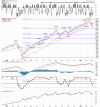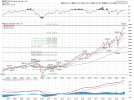YJ/TD advocate using "low cost" S&P index funds - especially for younger perhaps inexperienced investors - with dollar cost averaging contributions as a less risky method of accumulating wealth over long time periods. If one chooses this strategy, and has not investigated index funds closely, the following information might be helpful.
The Cheapest S&P 500 Index Funds ... there are some with zero expenses; the next question .... how closely do they mirror the market?
Excerpts from ...... The Cheapest S&P 500 Index Funds Check Out the Index Funds With Lowest Expense Ratios
By
Lee McGowan reviewed by Marquerita Cheng Updated Oct 29, 2020
"While cheaper doesn't necessarily mean better, the
best S&P 500 index funds tend to be the ones with the lowest
expense ratios. You shouldn't base your decision to invest in an S&P 500 index solely on price, but if you plan to invest long-term, the seemingly small differences in fees can add up to a good amount of money. Here are some of the qualities of
index funds you'll want to analyze before thinking of buying."
Analyzing the Tracking Error
:The
tracking error is a measure of an index fund's effectiveness in replicating or matching the performance of the benchmark index, which in this case, is the S&P 500. One drawback of researching and analyzing tracking error is that mutual fund families do not publicly display the tracking error of their index funds. However, there are a few data points you can research to analyze performance tracking.
You can go to a site, such as Morningstar, Lipper, or Kiplinger's, and see how close the historical performance of the fund has been to the target benchmark. If the returns are below the benchmark by roughly the same amount as the fund's expense ratio, the tracking error is close. For example, if a fund has an expense ratio of 0.2%, a 5-year annualized return of 10%, and a benchmark return of 10.2%, the tracking error is precise."
Analyzing the Expense Ratio
"After looking at the historical performance, while taking the expense ratio into account, which will tell you how well the fund has tracked the benchmark index in the past. For example, if an S&P 500 index mutual fund has an expense ratio of 0.2%, a 5-year annualized return of 10%, and a low tracking error might have an annualized return of roughly 9.8%. This means that the only difference between the index and the mutual fund's return is attributed to the fund's expenses."
Before Investing
"Before deciding on an index fund to invest in, be sure to keep in mind other fees, such as trading costs. For example, if you already have an account at Vanguard, you may be charged a transaction fee to purchase a mutual fund, like the Schwab S&P 500 Index, which is outside of their fund family. Typical transaction fees range between $10–$20.
If you are dollar-cost averaging by periodically purchasing shares of your S&P 500 index fund, the expense ratio may be lower, but the trading fees can make the fund more expensive than other options. You will find some of the cheapest
S&P 500 funds that you can buy with $10,000 or less listed below."
Why Fees Matter
"Although S&P 500 index funds are all constructed to match and track the S&P 500, they are not the same across the board. Most notably is the difference in fees between funds. A difference in fees between 0.01% and 0.03% may not be significant, but differences of 0.05% or more between funds can make a significant difference on your wealth through your working years leading into retirement."
Examples of index fund fees from some of the more well known firms ....
Fidelity 500 Index Fund .15 Schwab S&P 500 Index Fund .02 Vanguard 500 Index Fund Investor Shares.14 T. Rowe Price Equity Index 500 Fund .21


